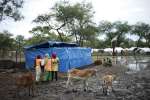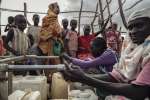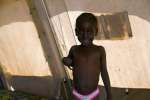Fuji Optical puts focus on needy people in Azerbaijan
News Stories, 30 June 2005

SABIRABAD, Azerbaijan, June 30 (UNHCR) – As a teacher, Marziyya Akhmedova needs to have eyes like a hawk to keep her students in check. But a few months ago, her eyesight started deteriorating due to the demands of her job – marking homework and squinting over details.
When the 40-year-old mathematics teacher asked for help at the poorly-equipped provincial hospital, she was told to go to the capital Baku for an ophthalmology screening, which would mean spending unnecessary money for a woman heading a family of five.
Akhmedova was all set to leave for Baku when she was told she could get a free check-up and eye glasses from the Fuji Optical mission that was travelling to Azerbaijan. Examined and fitted with proper spectacles by the visiting experts, she was soon back in action, reading newspapers in her new glasses.
"I am fully equipped to be back to school," she said. "It is not only that I can see things better. I think with these glasses I can better see my future. Now I am fully able to do what I always enjoyed doing – helping kids to grow into normal adults despite unfavourable conditions."

Akhmedova teaches at Shahriyar camp that houses more than 2,000 internally displaced people who fled Fizuli and Jebrail in 1993. She was among some 1,500 people who benefited from Fuji Optical's five-day screening in Azerbaijan earlier this month.
Led by Fuji Optical President Dr. Akio Kanai, the six-person mission provided optical aid to refugees and asylum seekers from Afghanistan, Chechnya, Iran and Iraq, as well as displaced people living in Sabirabad and Hajigabul districts. Other vulnerable Azerbaijanis like orphans and the elderly also had their eyes examined and received free spectacles. An additional 68 pairs are arriving from Japan within weeks.
The Azerbaijani authorities facilitated customs clearance of pre-shipped optical materials, while UNHCR and its partners provided shuttle buses in Baku and appointment slips in the field. Pre-selection and registration by the International Medical Corps and the Caspian Compassion Project, as well as logistical arrangements by the United Methodist Committee on Relief, prevented overcrowding and allowed the Fuji Optical team to examine more people than planned.
At the end of the mission, the Azerbaijani government thanked the Fuji Optical team and expressed interest in further cooperation. It also emphasised UNHCR's increasing role in attracting new actors to the country to help not just refugees but also displaced people and the neediest populations.
By Vugar Abdusalimov
UNHCR Azerbaijan












































